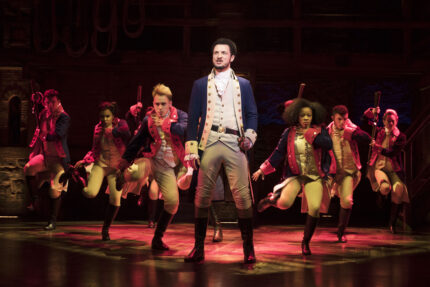A Tale of Two Tragedies
The premise of a tragedy is simple; it ends in death. The audience knows this from the outset. The protagonist, who seemingly has the potential to do great things in the world, succumbs to his fatal flaw and thereafter there can only be one outcome: fatality. Choices are made and cannot be unmade, setting the star of the show on an irreversible downward spiral. Whether the concluding act be the physical death of the title character, as in Hamilton, or more metaphorical as in the political suicide committed by Donald Trump in this year’s US election campaign, the audience is left with the opportunity to reflect on what could have been done differently.

Photo by Joan Marcus
Tragic ‘Heroes’?
Every tragedy needs its tragic hero; the tragedy ensues from said hero’s ‘Achilles’ Heel’. In the case of both Hamilton and Trump the fatal character flaw is pride, albeit manifested in rather different ways. Pride (known as superbia in Latin) is believed to be the deadliest of the seven deadly sins, the source of all other capital sins. Shakespearean tragedies illustrate the truth of this: Othello’s jealousy, King Lear’s arrogance and Macbeth’s ambitious greed all derive from pride, which in biblical terms is defined as prioritising the will of the self over the will of God, while in more modern usage refers to excessive regard for oneself and one’s achievements.
Both definitions apply to Hamilton and Trump, to varying degrees: Hamilton, as an immigrant, has to ‘holler just to be heard’ so seizes his opportunity to make something of himself (reflected in My Shot), but in doing so becomes so obsessed with creating his legacy that he over-reaches himself, like Icarus in the Greek Myth; Trump, on the other hand, allowed his ego to eclipse the facts in front of him and therefore missed the opportunity to shift his strategy to match the shifting demographic in his country. Trump’s presidency was freighted with accusations of xenophobia, misogyny, racism etc., all of which seemed to leave him unscathed, thus fostering a sense of bullet-proof confidence. This complacency, this pride, provided him with a suit of armour. Major game-changers such as coronavirus and the Black Lives Matters movement have been dismissively treated as inconsequential in the face of Trump’s own inflated and unsubstantiated opinions, and this has been his undoing. Such a character defect has been defined as the Dunning-Kruger Effect: ignorance of one’s own shortcomings. The tragedy, of course, derives from the fact that Trump’s strengths, his ‘charisma’ (he is not boring, whatever his other defects), his refreshingly natural ability to eschew political platitudes, and his passionate sense of conviction, could have helped him forge a strong presidency. He possessed a cult-like following. He is not a fundamentally stupid man. The fact that the 2020 election has been so close-fought highlights his continuing popularity with swathes of Americans. None of these strengths stand up, though, when juxtaposed with his overwhelming pride: his reckless hubris; flying too close to the sun. Perhaps The New Yorker got it right when it advocated that ‘Donald Trump should see Hamilton’.
Diametrical Oppositions?

Photo by Matthew Murphy
Lin Manuel-Miranda’s Hamilton, ‘An American Musical’, began life as a college workshop but quickly resonated with global audiences. This is the story of a Caribbean immigrant who embraces the concept of carpé diem and rises from poverty to a powerful political position. It is a story that embraces the ideals of diversity and equality of opportunity, this strikes a chord in the modern public psyche. A sense of hope for political collaboration and unity is inherent in the musical’s lines: ‘Two Virginians and an immigrant walk into a room/Diametric’ly opposed, foes/ They emerge with a compromise, having opened doors that were previously closed’. Alexander Hamilton’s vision of successful racial integration is at the opposite end of the spectrum from Donald Trump’s political agenda and its focus on immigration restrictions embodied in his 2016 promise to (literally) construct a wall. Amid a proliferation of terrorist attacks and existential threats to the western world, isolationism of this nature had the power to speak to the American public, hence, leading Trump all the way to the White House. At that time, he was able to connect with many Americans on a visceral level; in fellow Republican John McCain’s words, he ‘fired up the crazies’. Both Hamilton and Trump appeal to different sectors of US society, so to look at Hamilton and Trump is to look at two contrasting ideologies. And yet, on closer inspection, there are many parallels between these two figures. Both were the son of a Scot; both lived in New York; both were outsiders who had to fight their way into the political echelons. And Thomas Jefferson’s observation that Hamilton ‘smells like new money, dresses like fake royalty’ could equally apply to Donald Trump’s somewhat vulgar ostentatiousness. Not least, of course, is the fact that they are both tragic figures who fall victim to their own pride…
Pistols at Dawn

Political rivalry is a clear parallel we can draw between the situation in Hamilton and the 2020 race for the POTUS. Rivalry provides a fertile breeding ground for pride to make its presence felt. There are stark similarities between Hamilton’s well-documented feud with Aaron Burr and Trump’s very public skirmishes with opponent Joe Biden. Hamilton famously believed that Burr was ‘one of the most unprincipled men in the United States’, while the more politically expedient Burr thought that Hamilton should ‘talk less, smile more’. He was really advising that Hamilton play the political game rather than stick doggedly to his personal principles and aspirations. The rivalry, which properly commenced in 1791 when Hamilton’s father-in-law was defeated by Burr in a Senate race, ended tragically in an 1804 duel in which Hamilton died. Throughout the course of their ill-fated sparring, these two grown men engaged in the rather puerile practice of exchanging vitriolic letters, the Revolutionary period equivalent of Donald Trump’s beloved Twitter dogfights. Despite Hamilton’s brilliance (he was America’s first treasury secretary, a scintillating lawyer and prolific writer) his quest for glory made him many enemies, This self-assurance meant there was never any real chance that he would turn down Burr’s invitation to a duel. Cue tragic denouement.
Donal Trump, meanwhile, has never missed an opportunity to undermine his rival, even labelling Biden as ‘One Per Cent Joe’ well before their race began proper, and childishly declaring that ‘Joe Biden is a dummy’. He underestimated his opponent and over-estimated himself, the very epitome of pride. In truth, Joe Biden had very little to do in order to trounce Trump; it is Trump’s shortcomings that make Biden look strong. Biden’s promises to tackle coronavirus, address BLM, provide grants to minority communities, reverse Trump’s immigration policies. and so on are all rather predictable and trite. But in a battle between a hectoring bully and a resounding bore, it is the bore that has tapped into the political zeitgeist and claimed victory. Not so much of a dummy, then. Biden has played the game of politics to perfection and won. One would think he’s been advised by Burr. And, typical of all tragedies, Trump is a sore loser, casting dignity, common sense and logic to one side. Hamilton, of course, paid an even bigger price for losing: his life.
Of course, the doom-laden pride of these two protagonists appears in other aspects of their lives, not just in their rivalries. Hamilton, for example, became embroiled in a sex scandal which he only admitted to in

order to avoid accusations of embezzlement; a quick Google search offers up a proliferation of infidelities and misogynistic behaviour relating to Donald Trump. As in the political arena, proud individuals require adulation in their private lives too.
Legacy
Of these two tragic stories, there will be two very different legacies: Hamilton the musical is a testament of its namesake’s quest for recognition. His aspirations have been realised, his pride was, perhaps, not so misplaced. For Donald Trump, however, his legacy may be somewhat different. It is too early to tell. With Trump’s ego in the frame, he may yet rise from the ashes of this annihilation.
Where pride is concerned, it seems that the individuals afflicted with it believe themselves capable of even the impossible. For the rest of us, we know one thing for certain: it comes before a fall.




